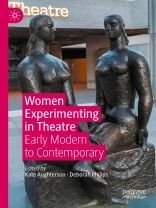This collection of essays, covering a broad historical range, shows that women working in theatre and drama since the time of Aphra Behn have been engaged in pushing the boundaries of conventional representation and dramaturgical convention. Collectively the authors show that women have used performing spaces as a channel for both political and personal radicalism – one that has demanded and celebrated experimentalism as a kind of survival in a male dominated world.
Table des matières
Introduction Kate Aughterson and Deborah Philips.- Chapter 1. Stage (Im)Properties: Aphra Behn’s Radical Stagecraft, Kate Aughterson (University of Brighton).- Chapter 2. Innovative Centilivre, Margarete Rubik (University of Vienna).- Chapter 3. Elizabeth Inchbald’s Dramaturgy, Chelsea Philips (Villanova University).- Chapter 4. ‘Dead, dead, and never called me Mother’ – East Lynne, melodrama and adaptation, Peter Blake (University of Brighton).- Chapter 5. Women Playwright-Managers and the Independent Theatre Society in Fin-de-Siècle London, Renata Miller (City University of New York).- Chapter 6. See it, be it, say it, play it: representations of militant activism and activists in suffrage theatre and entertainments, Naomi Paxton (Central School of Speech and Drama).- Chapter 7. What was modernism’s problem with the theatre?, Helen Carr, (Goldsmiths).- Chapter 8. ‘You have produced a good deal of raw material from which you , and, or a group of actors may or may not produce a good play’: Shelagh Delaney, Joan Littlewood and the Theatre Workshop production of A Taste of Honey, Deborah Philips (University of Brighton).- Chapter 9. Freaks, Prophets, Witches: New Forms, Collaborations and Communions in Women’s Theatre 1969-1992, Susan Croft (Director, Unfinished Histories).- Chapter 10. ‘My sister she wants – / Don’t tell me’: Desire, Negation, Interruption and Agency in Sarah Kane’s Work, Dr Nina Kane (University of Huddersfield).- Chapter 11. Beyond Mimesis: Generic Crossings between Poetry and Drama in Plays by tucker green, Kay and Harris Elisabeth Bekers, Janine Hauthal & Jade Thomas (Vriejat Universitat Brussels).- Chapter 12. Feminist revisions: reframing Greek tragedy in the work of Mnouchkine, Mitchell, Carson and Churchill, William Mcevoy (University of Sussex).- Chapter 13. We Need To Talk About Essex Girls: Working Class Women and Twenty-First Century British Theatre, Katy Shaw (Northumbria University).- Chapter 14. Decolonizing experimental theatre: Experiments in Living in the Work of Gurpreet Kaur Bhatti, Gabriele Griffin (University of Uppsala).- Chapter 15. British stage design now: Womxn stage designers and experimentation, Rachel Hann (Northumbria University, Newcastle).- Chapter 16. Feminist Provocations: Experiments with Failure in the Plays of Alice Birch and Ella Hickson, Hannah Greenstreet (Independent Theatre maker).
A propos de l’auteur
Kate Aughterson has written widely on women’s writing and early modern drama, including, editing The Luckey Chance (2021); Renaissance Woman (1995), The English Renaissance: An Anthology (1998); John Webster: The Plays (2000), Aphra Behn: The Comedies (2003), Shakespeare: The Late Plays (2013), with Katy Shaw, Jim Crace: Into the Wilderness (2017); with Ailsa Grant Ferguson, Shakespeare and Gender (2020) and with Deborah Philips, Women and Experimental Fiction: Early Modern to Contemporary; with Jess Moriarty, Socially Engaged Creative Practice (2024) and Performing Maternities (2024).
Deborah Philips has written extensively on women’s writing and cultural history. Her books include: And This is My Friend Sandy: Sandy Wilson’s The Boy Friend, London Theatre and Gay Culture (2021), Fairground Attractions (2012), Writing Romance: Women’s Fiction (2006/2014), The Trojan Horse (2013) with Garry Whannel and Brave New Causes (1998) with Ian Haywood. She is the co-editor, with Kate Aughterson of Women Writers and Experimental Narratives: Early Modern to Contemporary (Palgrave Macmillan, 2021).












